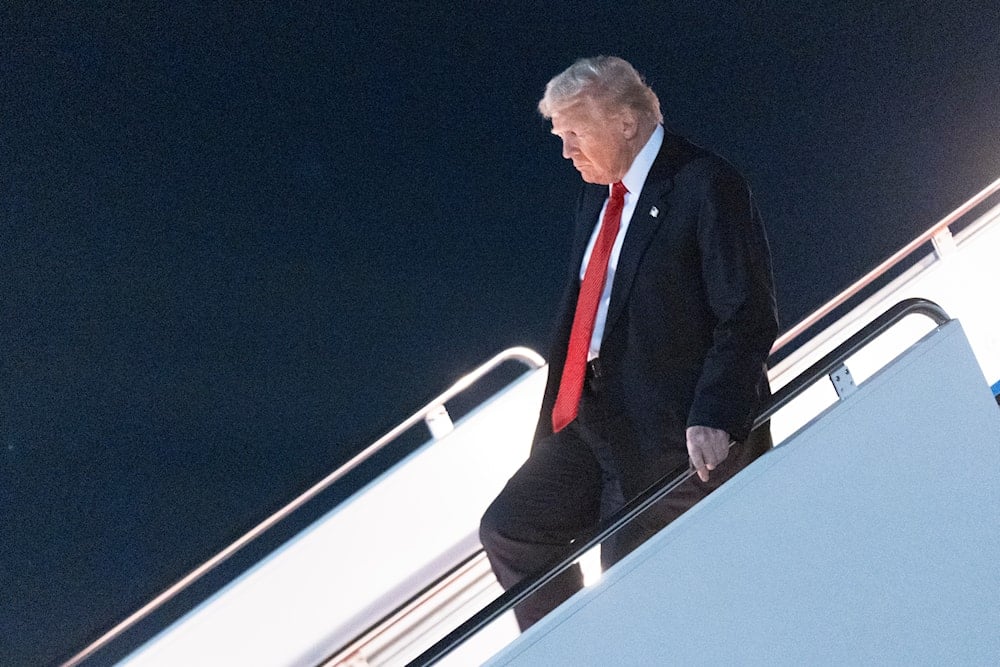As per war resolution, Trump should halt strikes on Caribbean, Pacific
The Trump administration says it will continue operations in the Caribbean past the War Powers Resolution deadline, claiming legal justifications amid UN criticism.
-

US President Donald Trump arrives at Joint Base Andrews, Md., on Air Force One, from a weekend trip to his Mar-a-Lago estate in Palm Beach, Fla., Sunday, Nov. 2, 2025 (AP)
Starting Monday, the US government is required to halt its military operations in the Caribbean and the Eastern Pacific under the War Powers Resolution, which stipulates that such actions must end 60 days after their commencement unless Congress explicitly authorizes their continuation, according to Brian Finucane in an article for Just Security.
The International Crisis Group advisor stated in his article that under US law, this 60-day period begins when the President commits armed forces to hostile or military operations without a formal declaration of war or specific authorization from Congress, setting a timeframe within which such actions must either be approved by the legislature or brought to an end.
US President Donald Trump notified Congress of the first strike in his operation on September 4, 2017, which means that the 60-day period expires today, November 3, 2017.
Trump admin. says Caribbean strikes won't be stopped by War Powers resol.
Despite this, some US media outlets reported that the Department of Justice stated that the military operations carried out by the White House in the Caribbean and Eastern Pacific could continue, leaving the legality and duration of the actions subject to interpretation and ongoing debate.
The head of the Office of the Legal Counsel at the US Department of Justice, Elliot Geiser, said that "the White House does not consider this operation to constitute hostilities that would trigger the 60-day limit," indicating that the administration views the actions as falling outside the constraints of the War Powers Resolution.
According to legal experts, this claim does not apply, and it is both dangerous and incorrect, as it undermines the authority of the US Congress.
In a White House statement, an unnamed senior administration official said that the lives of US service members are not being put at risk, as the attacks on vessels suspected of carrying drugs are conducted using drones launched from naval ships that are patrolling or positioned at a significant distance from the targets, allowing operations to be carried out without direct exposure of personnel to hostile environments.
“The operation comprises precise strikes conducted largely by unmanned aerial vehicles launched from naval vessels in international waters at distances too far away for the crews of the targeted vessels to endanger American personnel,” the anonymous source stated.
Trump admin. uses Obama-like precedent
The administration has reportedly informed Congress that President Trump has classified the situation as a “formal armed conflict” rather than “hostilities", a distinction that follows the precedent set during the presidency of Barack Obama.
Obama justified NATO’s 2011 air campaign over Libya using the same reasoning at a time when Congress was divided over the matter, and although there was initial disagreement, he later accepted the legal rationale put forward by his administration, establishing a precedent for defining military actions in ways that limit congressional constraints while maintaining executive authority.
The Trump administration does not explicitly reference the Obama-era justification as its foundation, but the reasoning closely mirrors it. Obama had defended his military operation on the grounds that no US troops were deployed on the ground and that Libyan forces were unable to mount effective resistance, which kept the risk of American casualties extremely low.
UN condemns US strikes on the Caribbean as human rights violations
Meanwhile, the UN’s human rights chief condemned US military strikes on vessels allegedly transporting drugs in the Caribbean and Eastern Pacific, asserting that the lethal attacks breach international law and constitute “extrajudicial killings”, highlighting concerns over the legality and humanitarian implications of such operations.
Volker Türk stated on Friday that US strikes since early September have killed more than 60 people, describing the attacks as “unacceptable” and emphasizing that Washington must stop them immediately while carrying out prompt, independent, and transparent investigations to ensure accountability and compliance with international law.
Türk, while recognizing the difficulties in combating drug trafficking, stated that the circumstances surrounding the deadly strikes “provide no justification under international law,” underscoring that the operations cannot be legally defended despite the context.
"Addressing the serious problem of illicit drug trafficking across international borders is, as consistently recognized by States, a matter for law enforcement, subject to the strict restrictions on the use of lethal force established under international human rights law," Volker Türk emphasized.
He stated that, under the law, the deliberate use of lethal force “is only permissible as a last resort against individuals who pose an immediate threat to life.”
He added that, based on the “very limited information made publicly available by US authorities,” none of the individuals on the targeted vessels appeared to pose an imminent threat to the lives of others, raising serious questions about the legality and necessity of the strikes.

 5 Min Read
5 Min Read








